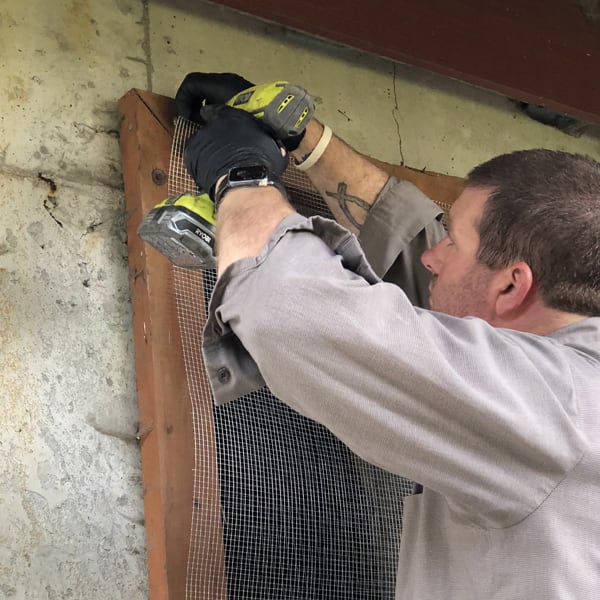Author: Kurt Treftz, Cascade Pest Control
There was a good reason that creatures might have been stirring in Clement Clarke Moore’s famous poem about the night before Christmas: winter. While Moore’s night in “Twas the Night Before Christmas” was absent nocturnal movement, stirring mice are a common occurrence as the temperatures drop and food becomes scarce. In fact, rats and mice are among the most common pests in the Seattle area – from urban blocks to suburban neighborhoods to rural homesteads, and even shoreline get-aways.
Our homes are a prime target for rodents seeking a refuge for food, shelter, and comfort. But since we don’t want to share our abode with critters bearing dirt and disease, the winter months are a good time to inspect and update our rodent protections.
Before the worst of the weather hits, it is wise to give your home a once-over. Here are some tips and tricks for rodent proofing your home for winter.

Exclude Rodents
The first line of defense is to physically prevent rodents from accessing your home. Rat (or rodent) exclusion is the preventive practice of sealing, screening, barring, or otherwise denying rodents any entry points to your building or home.
- Identify & seal entry points. As you’ve likely heard many times before, rats and mice can squeeze through deceptively small spaces, as small as a quarter for rats and a dime for mice. Check for any cracks in the foundation or areas where pipes, lines, or wires enter the house. Look for improperly sealed sinks or drains, gaps in the siding (especially on house corners), dryer vents, and damaged roofs, eaves, soffits.
- Screen & caulk. Galvanized mesh wire or screen can be helpful to keep rats and mice from entering your home. Place it over dryer vents or small openings. Other small holes can be fixed with caulk.
- Steel wool & foam. Another way to exclude rodents’ access to your home is steel wool and foam. If you have a hard-to-reach gap or hole use tightly packed steel wool which is difficult for rodents to chew. Or try expanding foam (or a combination of both). Expanding foam seals up holes and gaps to prevent all kinds of pests – from insects to rats – entrance to your home.
- Check doors & windows. Install door sweeps on bottom of doors and inspect weather seals along garage doors. Some screens can be chewed through by mice so invest in steel or other heavy-gauge materials.
- Check the flue. This is wise to do before winter starts for multiple reasons. If you are going to be starting fires for the season, make sure that your chimney is clean and nest-free. While an open flue is fine while you are actively burning a fire (a rat would have a death wish to come in that way), it should be closed when the fire is out. This reduces drafts in the house as well as unwelcome guests.
Repel Rodents (& Reduce Lures)
Another line of defense is to make a less compelling home for rodent invaders. If they aren’t tempted, they aren’t likely to make your home their home. This tactic includes both repelling the rodent as well as not unduly tempting them as well. Taking some of these steps as winter approaches is also good for your home too.
- Use repellants. While some highly touted “repellants” like Irish Spring or essential oils are not as effective as they are purported to be, there are some repellants like moth balls that are more effective. Of course, you only want to use these in storage areas, less frequented areas, and away from food.
- Adopt a cat. If you are in the market for a pet, consider a cat. Let this natural predator add another layer of protection. A cat isn’t a guarantee of a rodent free home, but they are known to deter mice and other rodents.
- Keep things tidy. Rats and mice are attracted to a food source, and your kitchen might be quite enticing. Be sure to wipe counters and sweep floors so as to not unnecessarily attract rodents.
- Store food in air-tight containers. Another step in reducing smells that attract rats and mice is to keep your food in sealed, air-tight containers. A little organization can go a long way to cutting down on rodent temptation.
- Clean drains. Believe it or not, your sewer can be an access point for rats who are quite good swimmers. A food disposal is one really attractive source of enticing smells to these creatures. Practice cleaning your kitchen drain periodically to cut down on rotting food waste smells. This can be especially important in winter before food sources become more scarce for rodents.
- Avoid leaving pet food out. Many of us are in the habit of leaving pet food out and accessible for our pets. But that also means it is available for rodents as well. Practice putting away pet food at night so as not to attract undesirables.
- Empty out standing water. Water is also a need for rats and mice, so if they find a good source of it in your home, they are likely to settle in. Clear out areas of standing water and fix water leaks as soon as you are aware of them.
Trap Rodents
Lastly, you can attempt preventative traps that can tell you when and where rodents might be finding access to your home. If you can catch them in the act or see where you get the most rodent activity, you can respond appropriately.
- Catch them on camera. This could be another good use of those ring cameras. If you have cameras around the perimeter of your home, you can use it to watch areas of concern. There are security and wildlife cameras that are set to alert when they catch movement. Mice are small and fast so you might need to invest in a higher-quality video, but this can be a good source of information about how rodents are accessing your home.
- Catch them with kill or no-kill traps. Even if you don’t have an infestation, you could lay some preventative traps in areas of concern or high likelihood of entry. Setting off a trap can alert you to a problem before there is a full-blown infestation.
Taking a few steps now can save you time and money later. Consider rodent proofing your home and keep those twitchy noses out of your business.
